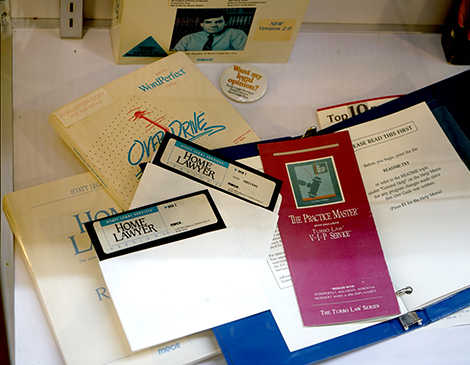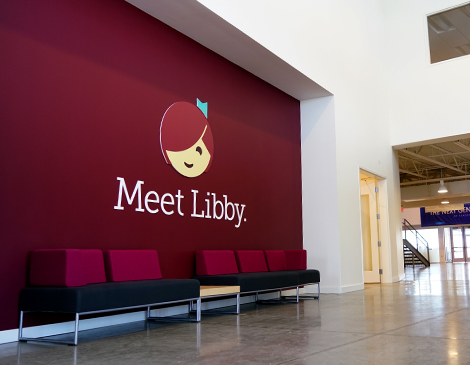With Libby, Kanopy and Sora, Cleveland’s OverDrive Captures New Generations of Readers
by Annie Nickoloff | Jun. 24, 2025 | 9:00 AM

Jason Libal
Steve Potash has a “brag book.” In his OverDrive office, he pulls off his glasses, unfolds his dual-touchscreen phone and swipes to a video of Drew Barrymore and Ross Matthews fawning over Libby, OverDrive’s library-lending e-book and audiobook app. He swipes again, to a video of director and actor Ethan Hawke praising OverDrive’s film app Kanopy, which the company acquired in 2021.
Libby, Kanopy and Sora — OverDrive’s crown jewels of e-book, film and education apps — are based in Garfield Heights, but they have gone global. The apps serve organizations in 115 countries and, in 2024, were used to make 739.5 million digital checkouts. They’ve touched every continent, including Antarctica. They’ve even left the planet.
“We did the corporate library for SpaceX,” Potash says. “Sometimes, before they strap in for that long ride, we recommend they download Libby, some audiobooks, so they have some content while they’re up there on that journey.”

Behind Potash, a wide window overlooks the OverDrive headquarters’ walking trail, plus a par-3 golf hole that workers can hit on their lunch breaks. Downstairs, in the 141,000-square-foot building, a dozen employees lie in Savasana pose on gym mats, taking part in a weekly afternoon yoga class. Multiple fresh food markets offer a range of lunch options. Racks of clothing and tables of household goods make up an employee “freecycle” exchange. A sculpture of Sora’s mascot Comet, composed of 92,378 Lego blocks, stands proudly near a stairwell.
It all feels straight out of Silicon Valley.
Here in Potash’s second-floor office, things are a little less over-the-top. Elements of OverDrive’s history and the CEO’s life are visible in notes, concert tickets, documents, framed photos and university degrees around the room. A superhero-styled librarian figurine is perched above a shelf of Celsius energy drinks. A stress ball in the shape of a cartoon sun sits conveniently near his keyboard, with his catchphrase printed on the back: There are no bad days in e-books.
The company, which employs more than 500 people, first emerged in the form of floppy disks and CD-ROMs to simplify Potash’s former law practice in the ’80s. Then, it developed into OverDrive, an early platform for e-books and audiobooks. Alongside OverDrive, the company created the simplified Libby in 2017, and fully switched over all library lending from the OverDrive app to Libby in 2023. Now, Libby partners with libraries of every size and shape, in communities, schools, universities, corporations, prisons and militaries.

This vital tether to library systems came from a “magic moment,” Potash says, with Cleveland Public Library after the dotcom crash of the early 2000s. Following a suggestion from OverDrive co-founder Loree Potash, Steve’s wife, he connected with a team of Cleveland librarians at an American Library Association conference. The organization sought an e-book rental system for users to borrow books with their library cards, download them and read them offline. Together, OverDrive and CPL designed the system’s experience in the basement of CPL Main Library’s Louis Stokes wing.
RELATED: Cleveland Public Library’s Main Library Is a Place of Firsts
In 2003, the product launched, cementing CPL’s place as the first U.S. public library to offer e-book rentals. The moment also redefined Potash’s company.
“There’s no denying that, 25 years ago, sitting in the basement on Superior Avenue, the Cleveland Public librarians laid out a road map for what would be, today, the most successful digital media lending platform, used by thousands of institutions in almost every country,” Potash says. (Another entry in his “brag book.”)
OverDrive’s success rose alongside recent trends in audiobook growth and digital readership, which spiked during the COVID-19 pandemic.
Now, five years later, as OverDrive’s apps are being used more than ever, potentially drastic shifts in library funding might impact the company’s primary clientele. Executive orders issued by President Donald Trump in March aimed to dismantle the Institute of Museum and Library Services. Despite that, IMLS funding later flowed to Ohio libraries in May, with uncertainty clouding future federal funds.
Simultaneously, state legislation is considering reductions to Ohio’s Public Library Fund. Governor Mike DeWine proposed a budget of 1.75% (an increase of 0.05% from the previous allocation) of the state’s General Revenue Fund, but the Ohio House of Representatives instead passed a budget that cuts the PLF and moves toward a flat funding appropriation for libraries instead of a percentage. This would reduce the library’s cut of the budget by tens of millions of dollars.
As of June 20, a budget is being considered by the Ohio Senate ahead of a vote. DeWine will sign the next budget by June 30.
Potash is concerned, but he’s confident in his business despite the many changes for his primary customers.
“We’re keeping an eye on all of the challenges our institutional partners are facing, and we’re redoubling our efforts to say, ‘How can we help? How can we do more for you if you’ve lost budget, if you’ve lost staff?’” Potash says. “It’s been effective near-term, but there’s so many unknowns.”

In the face of unknowns, he is grounded in OverDrive’s mission, particularly through Sora. The app, which launched in 2018, gamifies student reading and allows teachers to monitor progress, aiming to personalize user experiences and create better literacy outcomes.
“The city of Cleveland, unfortunately, we are one of the top metro areas with pandemic-level adult low literacy,” says Potash. “I honestly believe we’re going to, in the next three to five years, in the classroom, deliver improvements on what matters.”
Potash, who serves on University Hospitals’ board of directors, sees how low literacy can affect health, wellness, financial security and career options: “It all starts with an underpinning of reading.”
“This is why I’m here,” he proclaims, loud and sharp. Then he softens his volume, thinks to those looming budget cuts, and the challenges OverDrive faces in 2025. “Sorry, I get excited. We have a lot of work to do, because libraries are under attack.”
He squeezes his custom stress ball and maybe reminds himself, for a moment: There are no bad days in e-books.
For more updates about Cleveland, sign up for our Cleveland Magazine Daily newsletter, delivered to your inbox six times a week.
Cleveland Magazine is also available in print, publishing 12 times a year with immersive features, helpful guides and beautiful photography and design.

Annie Nickoloff
Annie Nickoloff is the senior editor of Cleveland Magazine. She has written for a variety of publications, including The Plain Dealer, Alternative Press Magazine, Belt Magazine, USA Today and Paste Magazine. She hosts a weekly indie radio show called Sunny Day on WRUW FM 91.1 Cleveland and enjoys frequenting Cleveland's music venues, hiking trails and pinball arcades.
Trending
-
1
-
2
-
3
-
4
-
5










